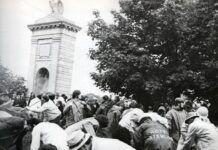
Donna Laffey Mantione (left) Lillian Laffey and WBRE/WYOU-TV reporter Madonna Mantione look at photographs and old newspaper clippings from the Agnes flood of 1972. Laffey’s home was destroyed by the flooding.
Kevin Carroll | Times Leader
For area family, devastation of Agnes lasts a lifetime
Click here to subscribe today or Login.
In the summer of 1972, Lillian Laffey had her dream home.
A beautiful home in the Colonial Village development in Wyoming, a home where she lived with her husband and two children, looking forward to watching them grow and play and laugh.
By the end of June, Lillian’s dream had turned into a nightmare when Agnes arrived.
Laffey and her daughter, Donna Mantione, sat down with a reporter from the Times Leader and WBRE/WYOU reporter Madonna Mantione, daughter to Donna and granddaughter to Lillian, to share her memories from the Agnes flood, a disaster that left Laffey and her families like it left many other people around the Wyoming Valley: with no home to return to.
“When I returned to my house, I couldn’t believe that it was even my house,” Laffey said of her trip back to where her home stood after the floodwaters receded. “It was hell. … We couldn’t go back in our home, because there was no home.”
To this day, there aren’t any homes in the general spot where the Colonial Village development sat; in its place, a shopping center and, heading back off Wyoming Avenue, the Flack Little League occupies the spot where Laffey’s home and the rest of the development was, in essence, washed away by the Agnes flood.
“My home was moved right off the foundations,” Laffey said. “It took on so much water. … I was in disbelief.”
Laffey’s home had just been finished two years prior to the Agnes flood, and in every way, it was her dream home.
“We searched and searched all over for a nice home, but we came to the conclusion that the price was too much,” Laffey said. “We just had to build. … I loved that house, we had it just the way we wanted it.”
In the days leading up to the beginning of the storm and subsequent flooding, Mantione remembers that the parents around the development had been keeping a watchful eye on the Agnes cell as it began to take shape.
“I remember playing in the front yard, riding our bikes and parents were talking about this potential flood that was going to hit,” she said. “We didn’t think much of it, we were just kids.”
Laffey echoed her daughter’s statements with a familiar refrain that’s been recalled by a number of individuals in the 50 years since Agnes: They didn’t think it would be that bad.
“They only expected the creeks [to flood],” Laffey said, referring to nearby Abraham’s Creek. “We didn’t expect to have such a bad flood … maybe just a little water in the backyard, you know?”
The night before the storm began, a knock at the door woke the Laffey family from their slumber and altered their lives forever.
“Around 2 a.m., there was banging on our door,” Mantione said. “The first responders came and they told us to leave. We weren’t prepared for this. We basically packed a little suitcase and called relatives to try and find somewhere to go.”
Laffey recalled that she only packed a few essential items because, as she explained already, there was no way of knowing just how massive the disaster would be.
“I thought it would maybe just be some water in the yard,” she said. “I didn’t pack much or anything, just some important papers.”
Neither Lillian nor Donna could recall exactly how they were able to get to safety while the bridges in the area were being closed in preparation for the coming storm.
They eventually made it to an aunt’s house, where they stayed for a month before the government supplied them with a trailer outside the remains of their home, to stay in while they attempted to salvage anything that may have survived Agnes.
Even at such a young age, Mantione shared a few memories of her return to Colonial Village, including a bone-chilling reaction from her mother upon seeing the wreckage.
“One memory I have, when my mother entered the home, I heard her scream,” she said. “It was horrific, very traumatic.
“To see our home totally devastated, mud everywhere, windows busted … I was a young child, and it really left a traumatic mark.”
On the table where Donna and Lillian sat in their current home in Laflin where a number of pictures, images taken to forever immortalize the damage done by Agnes to their home: furniture destroyed and strewn about, mud and garbage caking everything in sight.
The family lost everything that they hadn’t carried out with them while evacuating.
“Everything was gone,” Laffey said. “A lot of our pictures, I tried to wash them but the mud and the river water was just so toxic that it just wiped the pictures out.”
Another disturbing revelation in the family’s return to their home came not with the things that had been destroyed or swept away, but by some of the things the Laffeys found in the wreckage that hadn’t been there before.
One of the most vivid memories in the minds of many who lived through Agnes, particularly those on the same side of the river as the Forty Fort Cemetery, were the disinterred corpses that were washed out of the cemetery and into the community.
The Laffeys were no stranger to that.
“On top of our house, there was a coffin, a coffin with the body still inside of it,” Laffey said. “In the back of our property, there were a few coffins there, washed up from the Forty Fort Cemetery.”
Laffey recalled how they would occasionally happen upon bones strewn around the yard, something that her daughter would also experience while playing outside.
“I remember playing during that time period, and we would stumble across a coffin or a dead body or remains,” Mantione said. “It was devastating.”
The Laffeys spent about a year living in the trailer they were provided before finally finding a new home, by Mantione’s recollection.
The memories, and the trauma, extended well beyond that for her.
“I would have nightmares as a child, and I would pretend to be asleep and say ‘this is not my life’,” Mantione said. “I told myself that I would wake up and I’m going to be back in my bedroom again, in my beautiful home with my dolls and toys, and that it never happened.”
All these years later, and the wounds still feel fresh for Lillian.
“My heart is aching talking about this, because it brings me back all these bad things from the flooding,” she said. “But it’s not going to go away. … It will never go away.”
In Laflin, Lillian and Donna are safely away from the river now, far from the areas that are prone to flooding during storms like Agnes, or more recently, the flooding from Tropical Storm Lee in 2011.
Even so, living through Agnes and watching everything she owned be swept away has ensured that Donna keep her guard up, to protect her children the way Lillian protected her and her brother during Agnes.
“You’re really watching out for that type of situation, and you just want to protect your family,” Mantione said. “Even though we lost everything [during Agnes], we still had each other and that’s very, very special.”
Looking back on the horrific events of that period of time, Mantione made one thing abundantly clear.
“I will never live in a flood zone again.”









